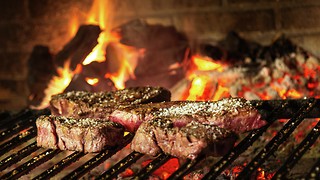The Death of the TV Talent Show
Self confessed TV Talent-Show addict Jenni Petty explores why the programmes have been declining in popularity

Talent shows have become a staple of television schedules, consuming our Saturday nights and in the case of Britain’s Got Talent live shows, our mid-week. They infiltrate even our advert breaks with slow-motion, glossy close-ups of panellists. Yet public interest in them is declining. For two years in a row, the X Factor has seen ever-decreasing viewing figures and Simon Cowell’s most recent venture, Food Glorious Food, debuted with just 2.7 million viewers in February. Even in the US, American Idol’s 2013 series averaged 2 million viewers fewer per episode compared to last year's figures and the X Factor USA has suffered low ratings from the outset. How do we explain this? As a self-confessed talent show addict, I must admit that even my interest is waning.
It’s not that the shows have become stagnant. If anything, it’s the constant suggestion of a ‘revolutionised’ format that proves most irritating and anti-climactic. Stories of new additions to judging panels fill newspapers, magazines and gossip websites with huge excitement but little if anything results from them. In the case of American Idol (aired on ITV2 in the UK), producers decided to ditch Steven Tyler and Jennifer Lopez in favour of Keith Urban, Nicki Minaj and Mariah Carey. The change prompted masses of media attention and hype, yet even a feud between Minaj and Carey didn't manage to boost ratings.
It is possible that there is simply no interest in participating or auditioning any more. Perhaps would-be contestants have grown wise to the fundamental character exploitation that accompanies a UK X Factor contestant’s ascendancy to the live shows and have realised that, ultimately, this show isn’t a platform for real talent? Recent revelations about the contestant's previous, reasonably successful, careers also conflict with their portrayal on such shows as meek, confidence-lacking and desperate for their first big break. We can no longer be certain of the ‘reality’ of such displays any more.
Programmes such as The Voice have decided against the courting of controversy, offering us a pared down format with little extraneous character detail. However, the overall effect of this is merely a degree of dullness; two hours of battle rounds can get quite exhausting. Moreover, for a show devoted solely to singing, the apparent lack of success of the undeniably talented winner of the first series, Leanne Mitchell, calls the whole approach into question.
The Great British Bake Off, by contrast, is one of the new breed of talent show which is altering our perception of the genre and drawing an ever-increasing number of viewers. It operates on a far smaller scale, pre-selects its contestants, runs only a modest publicity campaign and fawns far less over its judges and presneters. The show is far less self-important as a result and a little more lighthearted.
The talent show still offers a form of escapism, provided that one has a fast-forward button to hand. However, their predictability and questionable definition of ‘talent’ hugely undermine them. Perhaps the talent show in its voting-fuelled form has simply expired and lost what, initially, it had in abundance – novelty value and innocence.
 Science / Who gets to stay cool in Cambridge?7 September 2025
Science / Who gets to stay cool in Cambridge?7 September 2025 News / Government allows Gazan students to take up university places6 September 2025
News / Government allows Gazan students to take up university places6 September 2025 News / Tompkins Table 2025: Trinity widens gap on Christ’s19 August 2025
News / Tompkins Table 2025: Trinity widens gap on Christ’s19 August 2025 News / News in Brief: bird sightings, brain cancer, and government bye-byes 7 September 2025
News / News in Brief: bird sightings, brain cancer, and government bye-byes 7 September 2025 Lifestyle / Take a punt, go on a Blind Date 7 September 2025
Lifestyle / Take a punt, go on a Blind Date 7 September 2025









